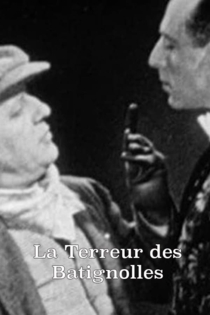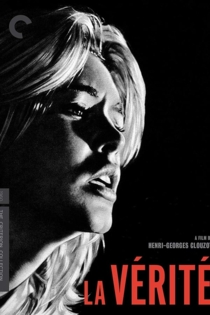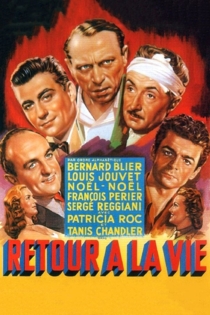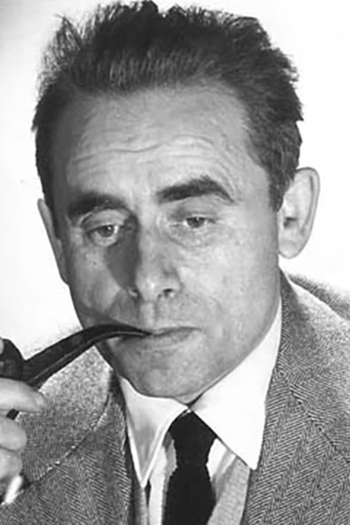
Henri-Georges Clouzot
1907 - 1977Clouzot was an early fan of the cinema and, desiring a career as a writer, moved to Paris. He was later hired by producer Adolphe Osso to work in Berlin, writing French-language versions of German films. After being fired from German studios due to his friendship with Jewish producers, Clouzot returned to France, where he spent years bedridden after contracting tuberculosis. Upon recovering, Clouzot found work in Nazi occupied France as a screenwriter for the German-owned company Continental Films. At Continental, Clouzot wrote and directed films that were very popular in France. His second film Le Corbeau drew controversy over its harsh look at provincial France and Clouzot was fired from Continental before its release. As a result of his association with Continental, Clouzot was barred by the French government from filmmaking until 1947.
After the ban was lifted, Clouzot reestablished his reputation and popularity in France during the late 1940s with successful films including Quai des Orfèvres. After the release of his comedy film Miquette et sa mère, Clouzot married Véra Gibson-Amado, who would star in his next three feature films. In the early and mid-1950s, Clouzot drew acclaim from international critics and audiences for The Wages of Fear and Diabolique. Both films would serve as source material for remakes decades later. After the release of La Vérité, Clouzot's wife Véra died of a heart attack and Clouzot's career suffered due to depression, illness and new critical views of films from the French New Wave. Clouzot's career became less active in later years, limited to a few television documentaries and two feature films in the 1960s. Clouzot wrote several unused scripts in the 1970s and died in Paris in 1977.
Description above from the Wikipedia article Henri-Georges Clouzot, licensed under CC-BY-SA, full list of contributors on Wikipedia
1940, main basse sur le cinéma français
Pierre-Henri Gibert
Sarah-Jane Sauvegrain, Louis-Émile Galey
Paris, 1940. German occupation forces create a new film production company, Continental, and put Alfred Greven – producer, cinephile, and opportunistic businessman – in charge. During the occupation, under Joseph Goebbels’s orders, Greven hires the best artists and technicians of French cinema to produce successful, highly entertaining films, which are also strategically devoid of propaganda. Simultaneously, he takes advantage of the confiscation of Jewish property to purchase film theaters, studios and laboratories, in order to control the whole production line. His goal: to create a European Hollywood. Among the thirty feature films thus produced under the auspices of Continental, several are, to this day, considered classics of French cinema.
1940: Taking over French Cinema
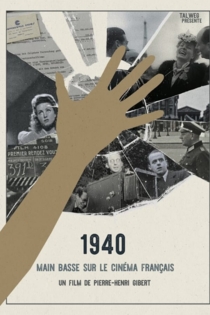
Le Salaire de la peur
Henri-Georges Clouzot
Yves Montand, Charles Vanel
In a run-down South American town, four men are paid to drive trucks loaded with nitroglycerin into the jungle through to the oil field. Friendships are tested and rivalries develop as they embark upon the perilous journey.
The Wages of Fear
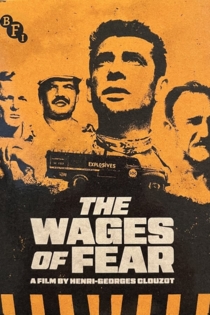
Les Diaboliques
Henri-Georges Clouzot
Véra Clouzot, Simone Signoret
The cruel and abusive headmaster of a boarding school, Michel Delassalle, is murdered by an unlikely duo -- his meek wife and the mistress he brazenly flaunts. The women become increasingly unhinged by a series of odd occurrences after Delassalle's corpse mysteriously disappears.
Diabolique
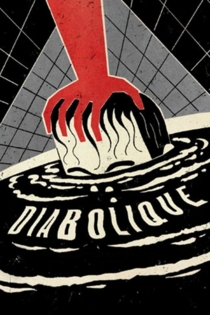
Le Corbeau
Henri-Georges Clouzot
Pierre Fresnay, Ginette Leclerc
Remy Germain is a doctor in a French town who becomes the focus of a vicious smear campaign, as letters accusing him of having an affair and performing unlawful abortions are mailed to village leaders. The mysterious writer, who signs each letter as "Le Corbeau" (The Raven) soon targets the whole town, exposing everyone's dark secrets. This allegorical film was highly controversial at the time of its release, and was banned in France after the Liberation.
Le Corbeau
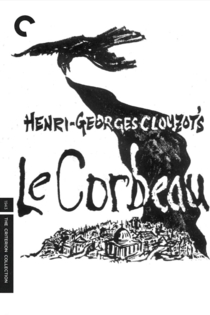
Quai des Orfèvres
Henri-Georges Clouzot
Louis Jouvet, Simone Renant
Paris, France, December 1946. Jenny Lamour, an ambitious cabaret singer, and Maurice, her extremely jealous pianist husband, become involved in the thorough investigation of the murder of a shady businessman, led by Antoine, a peculiar and methodical police inspector.
Jenny Lamour
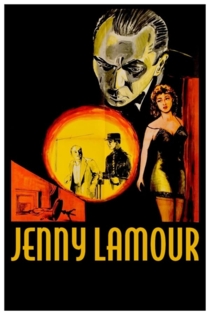
Le mystère Picasso
Henri-Georges Clouzot
Pablo Picasso, Henri-Georges Clouzot
Using a specially designed transparent 'canvas' to provide an unobstructed view, Picasso creates as the camera rolls. He begins with simple works that take shape after only a single brush stroke. He then progresses to more complex paintings, in which he repeatedly adds and removes elements, transforming the entire scene at will, until at last the work is complete.
The Mystery of Picasso
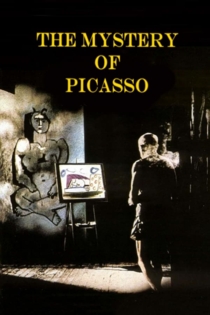
Henri-Georges Clouzot's Inferno
Serge Bromberg, Ruxandra Medrea
Romy Schneider, Henri-Georges Clouzot
In 1964, Henri-Georges Clouzot's production of L'Enfer came to a halt. Despite huge expectations, major studio backing and an unlimited budget, after three weeks the production collapsed. This documentary presents Inferno's incredible expressionistic original rushes, screen tests, and on-location footage, whilst also reconstructing Clouzot's original vision, and shedding light on the ill-fated endeavor through interviews, dramatizations of unfilmed scenes, and Clouzot's own notes.
Henri-Georges Clouzot's Inferno
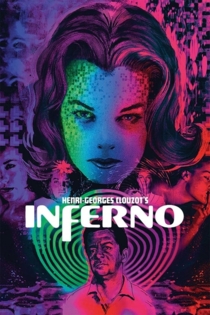
The Clouzot Scandal
Pierre-Henri Gibert
Aurélien Recoing, Bernard Stora
Great filmmakers claim the artistic influence of French director Henri-Georges Clouzot (1907-1977), a master of suspense, with a unique vision of the world, who knew how to offer both great shows and subtle studies of characters. Beyond the myth of the tyrannical director, a contrasting portrait of a visionary, an agitator, an artist against the system.
The Clouzot Scandal
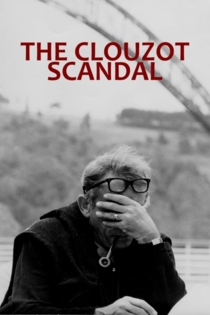
L'assassin habite au 21
Henri-Georges Clouzot
Pierre Fresnay, Suzy Delair
A serial killer by the name of Monsieur Durand stalks the streets of Paris. When Inspector Wens learns that the killer stays at a Paris boarding house, he gets a room there to keep watch.
The Murderer Lives at Number 21
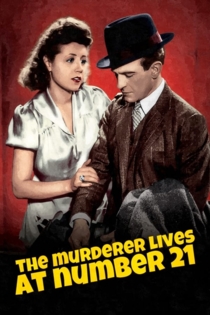
La prisonnière
Henri-Georges Clouzot
Laurent Terzieff, Bernard Fresson
Gallery director Stanislas bolsters the development of modern art with his collection of surprising works. His newest acquisition is a sculpture by Gilbert, whose wife Josée is captivated by Stanislas. But unbeknownst to her, Stanislas is amassing photographs of a very perverse, disturbed nature.
Woman in Chains
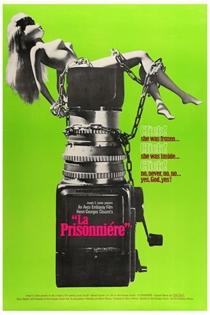
Carl Th. Dreyer
Jørgen Roos
Carl Theodor Dreyer, Henri-Georges Clouzot
At the world premiere of "Gertrud" in Paris, December 1964, Dreyer is greeted by many celebrities of the French cinema: Clouzot, Langlois, Truffaut, Godard, Anna Karina. Afterwards Dreyer delivers short comments on the style of each of his films.
Carl Th. Dreyer
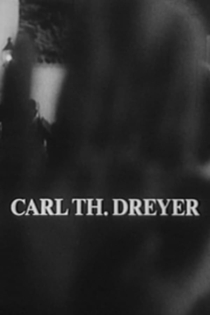
Manon
Henri-Georges Clouzot
Serge Reggiani, Michel Auclair
Port of Marseille, France, recently liberated from the German yoke. Caught as stowaways aboard a ship, Manon, a young woman who was accused of collaborating with the Nazis, and Robert, a freedom fighter who saved her from reprisals, tell the captain about the many challenges they have had to face in order to survive.
Manon
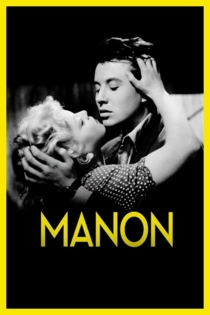
Les Espions
Henri-Georges Clouzot
Curd Jürgens, Peter Ustinov
A doctor at a run-down psychiatric hospital is offered a large sum of money to shelter a new patient. Soon the place is full of suspicious and secretive characters, all apparently international secret agents trying to find out who and what the patient is.
The Spies
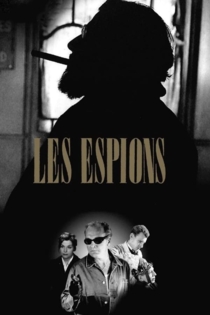
La terreur des Batignolles
Henri-Georges Clouzot
Louis-Jacques Boucot, Germaine Aussey
An expressionist comedy greatly influenced by German Expressionism set in a bohemian enclave of northern Paris, which Clouzot made shortly before he served as assistant director to Anatole Litvak and E.A. Dupont and began scripting French versions of German films at Berlin’s UFA studios.
The Terror of Batignolles
